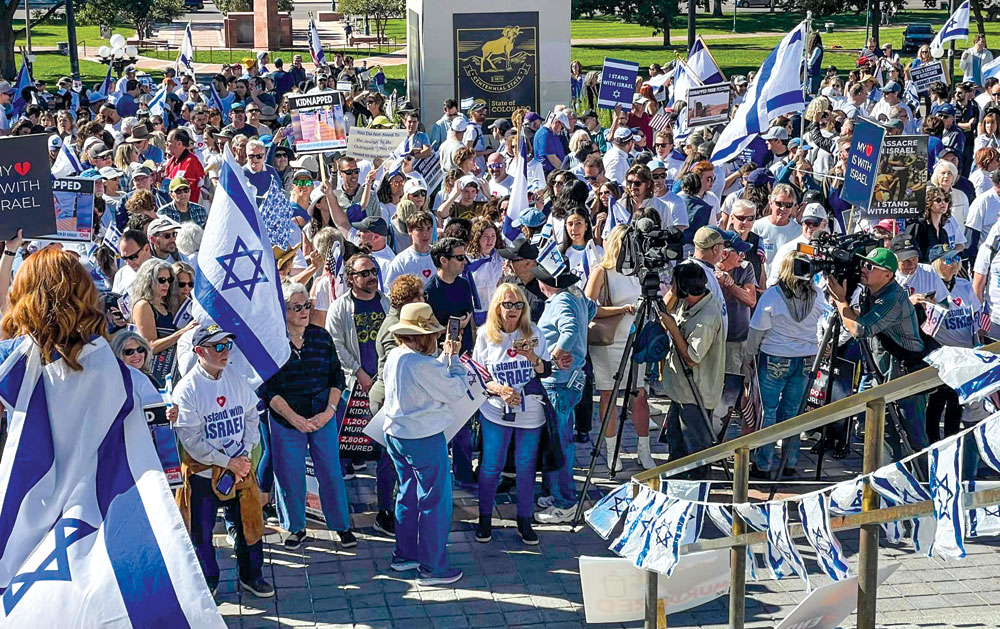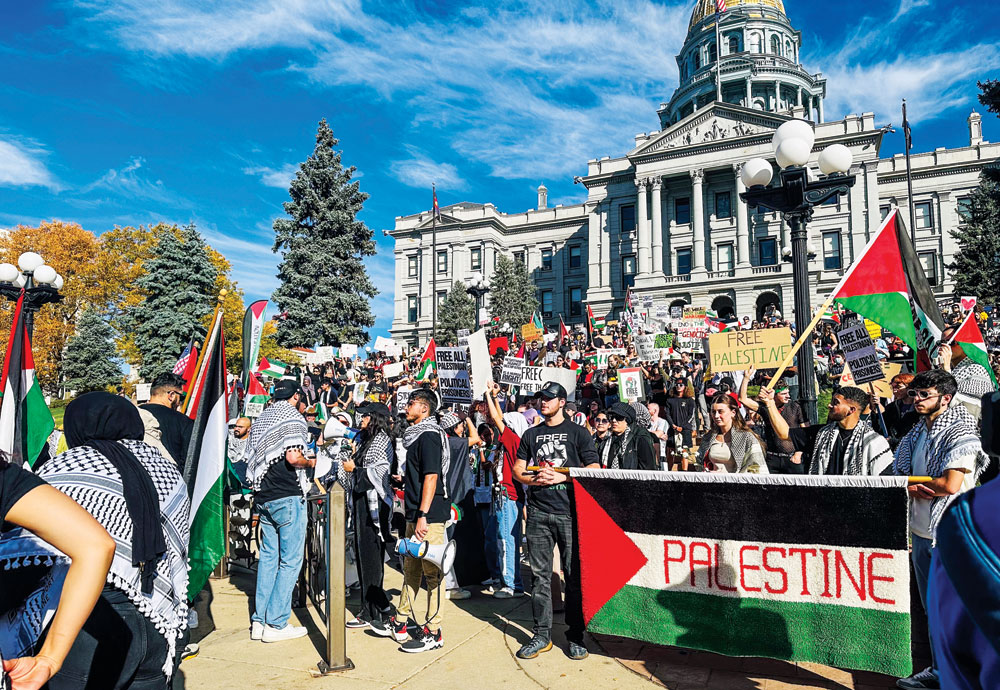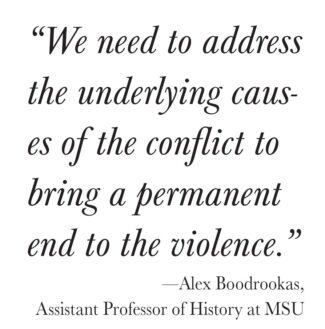
Israel supporters gathered at the State Capitol on Oct. 15 in a rally organized by the Colorado chapter of the Israeli American Council. Photo courtesy of JEWISHcolorado
Since Hamas’ Oct. 7 attack on Israeli citizens, the violence has escalated dramatically and painfully, memorialized in brutal photos. Each new atrocity and violation of our common humanity seems to eclipse the one before it with no end in sight.

Hundreds turned out on Oct. 21 for the Palestinian March to Stop the Killing of Palestinians in Gaza and Free Palestine at the State Capitol in Denver. The march was organized by the Colorado Palestine Coalition. Front Porch photo by Christie Gosch
This conflict began when Hamas extremists attacked several Israeli communities near the Gaza border, killing 1,400 Israelis and taking over 200 hostages. As Israel mounts a response to retaliate against Hamas and retrieve the hostages, many people are concerned that innocent civilians in Gaza are being put in danger by the violence.
It is difficult to imagine an outcome that does not leave everyone bereft. Grief, trauma, and fear for their communities at home and overseas unite two Denver spiritual leaders. Both have congregations informed by the trauma of their forbears and their own encounters with anti-Semitism and Islamophobia here in Denver.
 “Nobody’s well. We are all traumatized. Not in the same way as those in Israel are, but there’s no one who has any connection to their Judaism who doesn’t know someone who is impacted directly or indirectly by this tragedy,” says Sr. Rabbi Joe Black, of Temple Emanuel. Previously an outspoken critic of Israeli Prime Minister Benjamin Netanyahu’s “fascistic and fundamentalist” leanings, the assault on Israeli citizens has him firmly supporting the Israeli leadership now.
“Nobody’s well. We are all traumatized. Not in the same way as those in Israel are, but there’s no one who has any connection to their Judaism who doesn’t know someone who is impacted directly or indirectly by this tragedy,” says Sr. Rabbi Joe Black, of Temple Emanuel. Previously an outspoken critic of Israeli Prime Minister Benjamin Netanyahu’s “fascistic and fundamentalist” leanings, the assault on Israeli citizens has him firmly supporting the Israeli leadership now.
Imam Muhammed Kolila, spiritual leader of the Downtown Denver Islamic Center says, “Our grief is renewed every day.” Thousands of Palestinian citizens have been killed by the Israeli military since this recent conflict began. He says, “It’s not a number. It is our friends and families. They are actually people our community members know.”
Different Outlooks
Kolila, Black, and Alex Boodrookas, Assistant Professor of History at MSU, all strongly condemn the targeting of civilians. They all acknowledge that most Palestinians do not support Hamas. They differ on what should happen next in long-occupied Gaza, which is about the size of Las Vegas but is “one of the most densely populated places on earth,” according to NPR.
Boodrookas and Kolila emphasize the historical context of the war in Gaza, populated largely by refugees from the 1948 war and their descendants. Almost half of Gaza’s population of 2.2 million is under the age of 18, and many worry that further assaults will lead to more children dying. They want to see a cease-fire.
“We need to address the underlying causes of the conflict to bring a permanent end to the violence” says Boodrookas. Kolila echoes this and worries that “bombing and smashing Gaza to the ground will not make Israel happy or safe. Violence brings violence. Trauma brings hate.”
Black’s outlook differs. “This isn’t just a war against Israel. Hamas has said it’s a war against the Jewish people….We grieve for those who are impacted directly by Israel’s response, which I believe to be essential but horrific.” Black takes issue, however, with those who “equate Hamas’ barbarism with the Israeli Army’s response to protect its citizens.”
“This is not a symmetrical conflict,” says Boodrookas. He also emphasizes the historic role the U.S. has played in the conflict. Whereas some believe the U.S. should support Israel as an ally in a time of crisis, Boodrookas contends that the U.S. should focus on bringing about a lasting resolution. “Unconditional support for Israel has never worked. We need broader reconsideration.” Unless the U.S. leverages its aid to Israel to force a compromise, the Israeli government has no geopolitical incentive to bring about a just resolution.
Demonstrations on all sides of the issue have been held at the Auraria campus, the State Capitol, and elsewhere in metro Denver. Anger, trauma, and grief are common to those on all sides. Despite the shared emotions, however, polarization seems to be growing. Nuanced discussions informed by a deep understanding of history don’t garner headlines. Social media rarely allows for thoughtful dialogues of the context of any crisis.
A Glimmer of Hope?
When asked what gives them hope in light of the mounting violence, the answers vary:
—Rabbi Black: “I find hope in the unity I see in Israel, a country very divided two weeks ago. I find hope in the statement by our president that the U.S. stands squarely behind Israel. I find hope in the bravery of people who fought off terrorists.”
— Imam Kolila: “This is not about politics. You need to see these people dying before you as brothers and sisters in humanity. The Palestinians have been seen as subhumans by Israel. I hope that this trauma, this suffering right now, becomes an opportunity for people to see the humanity of the Palestinians.”
— Prof. Boodrookas: “I find hope in those who have experienced the death of a loved one but who are still asking for peace and equality.”
To learn more about the history of the conflict, Boodrookas recommends “Palestine, Israel and the Arab-Israeli Conflict” at the website for the Middle East Research and Information Project: https://merip.org/palestine-israel-primer/


0 Comments